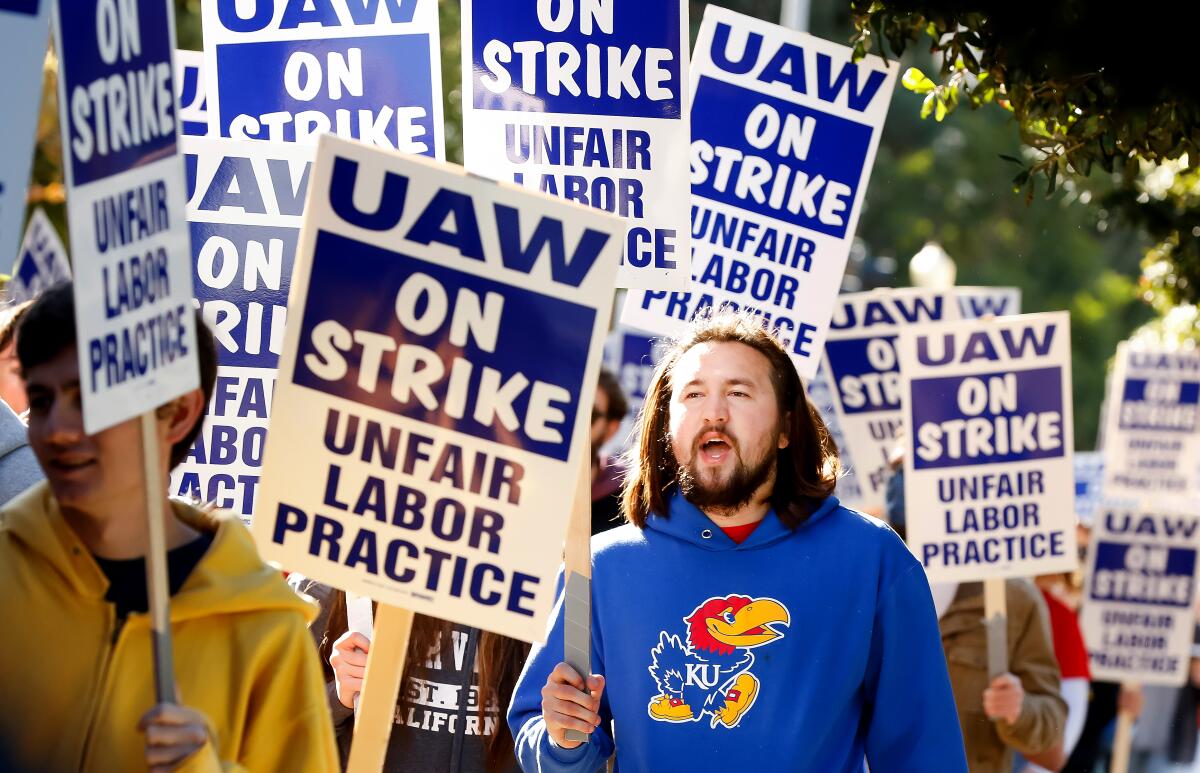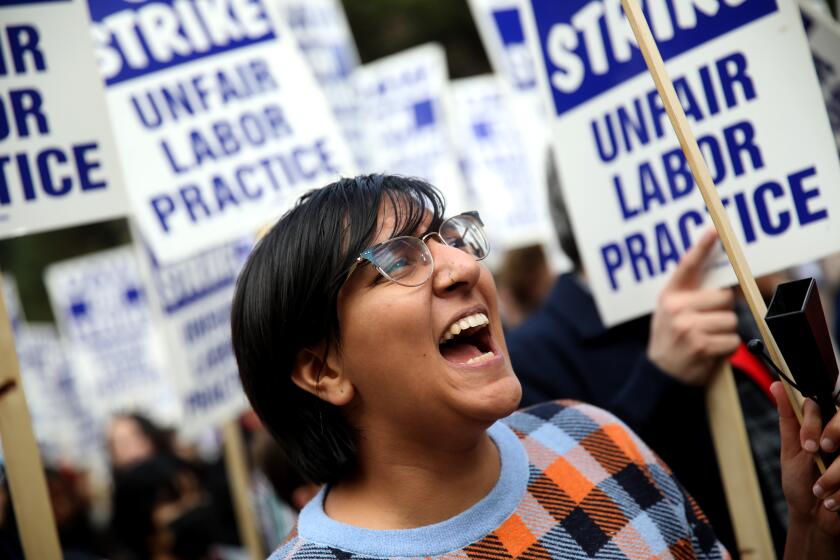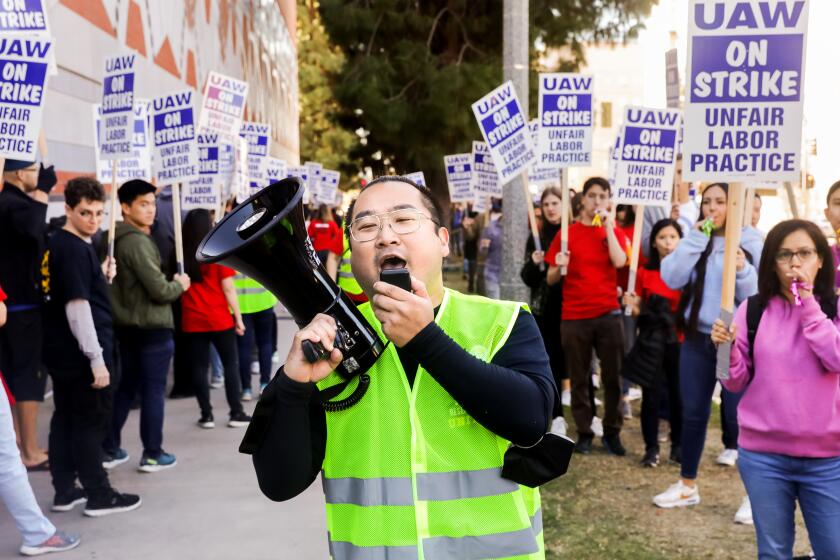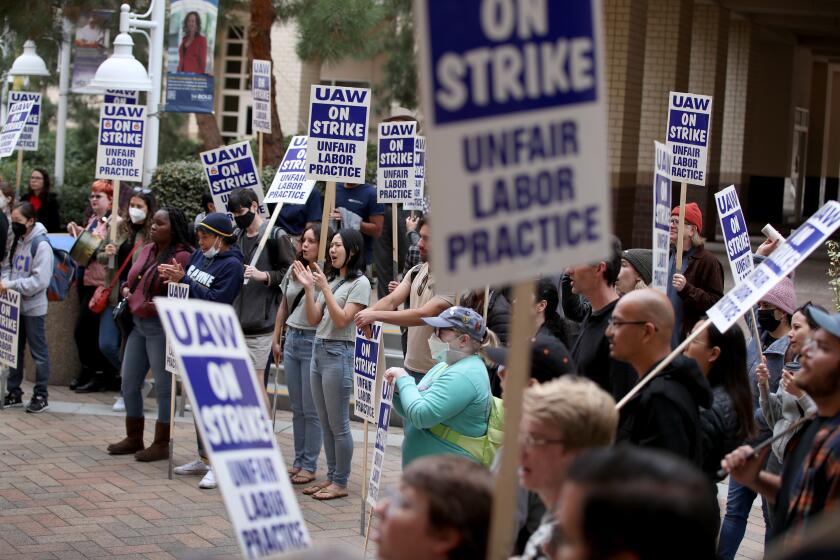After five-week strike, UC and graduate student workers reach tentative agreement

- Share via
In a major breakthrough in the five-week strike that shut down classes and unleashed grading turmoil, the University of California and the union leadership representing 36,000 graduate student workers reached a tentative labor agreement Friday that would boost their pay and improve benefits.
If approved by members, the agreement will resolve what had been the nation’s largest-ever strike of academic workers — 48,000 teaching assistants, tutors, researchers and postdoctoral scholars across the UC system’s 10 campuses and the Lawrence Berkeley National Laboratory. All sides hailed the agreement as a historic step that will potentially transform graduate student education and working conditions nationally.
The tentative agreement would give graduate student workers in two United Auto Workers bargaining units an increase in minimum pay from about $23,250 to about $34,000 for nine months of part-time work. The unions had demanded doubling their pay to $54,000 for 12 months — but union leadership agreed to take the offer to their members for ratification.
The UC strike is calling for better pay and benefits for teaching assistants, postdoctoral scholars, graduate student researchers, tutors and fellows.
Rafael Jaime, president of UAW 2865, which represents 19,000 teaching assistants, tutors and other graduate student instructors, said the ratification vote would take place from next Monday through Friday. His members, along with 17,000 graduate student researchers in the recently formed SRU-UAW, will remain on strike until and unless they ratify the agreement. He said he is “proudly” recommending ratification.
Jaime said that union members did not win everything they demanded but that the agreement would give the lowest-paid researchers an 80% pay boost over the life of the contract, which would be effective until May 31, 2025. He said those wage gains, which could amount to more than $13,000 annually at some campuses, will help alleviate the staggering rent burdens faced by many graduate students — many of whom shell out half their pay or more for housing.
The agreement also offers enhanced support for child care and healthcare for dependents. In addition, UC agreed to cover supplemental tuition for up to three years for eligible international students.
“This was a historic strike and we won a historic agreement,” said Jaime, a PhD candidate at UCLA. “This sets the bar for public higher education across the country.”
About 48,000 unionized academic workers across the University of California’s 10 campuses walked off the job, calling for better pay and benefits.
The breakthrough in the protracted standoff over wages and other issues, which has roiled finals and grading as students recently ended the fall term, came after both sides agreed last week to bring in an independent mediator. Darrell Steinberg, the mayor of Sacramento and former leader of the state Senate who helped broker an agreement earlier this year between Kaiser Permanente and roughly 2,000 striking mental-health clinicians, stepped in to mediate.
Earlier, UAW 5810, which represents postdoctoral scholars and academic researchers, ratified a new contract that boosted their minimum pay to $70,000 with adjustments, among the highest in the nation. The new contract also offers increased support for child care and healthcare for dependents, along with transit subsidies and protection against harassment and bullying — provisions also offered to graduate student workers.
“I would like to thank Mayor Steinberg, and negotiators for both the University and the UAW, for coming together in a spirit of compromise to reach this tentative agreement. This is a positive step forward for the University and for our students, and I am grateful for the progress we have made together,” UC President Michael V. Drake said in a statement.
“Our Academic Student Employees and Graduate Student Researchers are central to our academic enterprise and make incredible contributions to the University’s mission of research and education. These agreements will place our graduate student employees among the best supported in public higher education. If approved, these contracts will honor their critical work and allow us to continue attracting the top academic talent from across California and around the world. I would also like to thank our faculty, students, and staff, who have managed the burden of this strike with dedication and patience over the last month.”
In its fourth week, the massive academic workers strike has led to canceled finals, delayed grades and growing angst among students.
Steinberg, in a statement, congratulated both sides for ending what he called a “difficult impasse.”
“The union fought hard to ensure that the university’s graduate students make a living wage at every campus community. They achieved a new national standard for their members,” Steinberg said.
“President Drake’s leadership is a model for other universities throughout the country. This agreement represents a fundamental transformation for graduate level higher education.”
UC Board of Regents Chair Richard Leib praised Steinberg for helping the two sides break through the standoff in just a week. “It’s been the goal for us to support our graduate students and this agreement will allow us to continue to attract the best and the brightest,” he said.
Among union members, some took to Twitter on Friday night celebrating news of the agreement, saying the boosts in pay and benefits are setting a new precedent for academia.
But in a lengthy thread, a UC Santa Barbara graduate student laid out myriad issues with the bargaining process and said the contract proposal will not address worker needs.
“It gives us a raise that’s enough to disqualify us for govt assistance programs and bump us to the next tax bracket, but not enough to cover those new costs,” according to the tweet.
In a series of two tweets, a UCLA graduate student said the contract would continue to lead to “precarious housing situations, medical debt, skipped meals, inaccessibility, and racist policing,” for fellow UC workers.
Jaime, however, said the enhanced pay and benefits will make UC more accessible to a more diverse range of graduate students — especially those with lower incomes. “More people will be able to live and work near the University of California,” he said.
He added that it was still unclear how and when fall term finals and assignments will be assessed and grades determined. He said graduate students are appointed for each academic term and those terms end for some of them next week. His own appointment as a teaching assistant in an Introduction to Shakespeare class will end in two weeks, giving him time to grade at least some of the work if the agreement is ratified next Friday and the strike ends.
The tentative agreement includes:
For graduate student researchers, a new six-point salary scale will be set at $34,564.50 for 50% time work by Oct. 1, 2024. A side letter with UC San Francisco will move its researchers onto the salary scale by then as well.
For academic student employees, the minimum nine-month salary for teaching assistants will be $34,000 for 50% time work by Oct. 1, 2024. The rate at Berkeley, San Francisco, and UCLA will be $36,500. The university will proportionally increase the associate instructor and teaching fellow rates for Oct. 1, 2024 to correspond to the additional increases provided for teaching assistants.
Members of both bargaining units will receive certain student support funds. Child-care reimbursements will be set at $1,350/quarter or $2,025/semester, plus $1,350 for summer. The graduate student workers also will be entitled to an additional $100 per year, effective on Oct. 1, 2023, and Oct. 1, 2024.
Eligible student workers will continue to participate in the UC-sponsored student health plan to the same degree as other eligible students at that campus. UC will pay 100% of dependent child premiums for eligible student workers.
Under the tentative agreement, all unfair labor practice charges will be dismissed upon ratification and student employees will be expected to return to work and picket lines will be pulled down immediately.
Times staff writer Gregory Yee contributed to this report.
More to Read
Sign up for Essential California
The most important California stories and recommendations in your inbox every morning.
You may occasionally receive promotional content from the Los Angeles Times.














